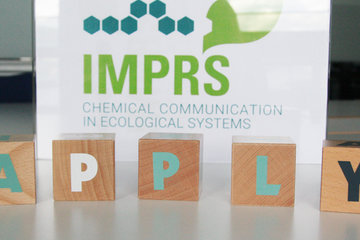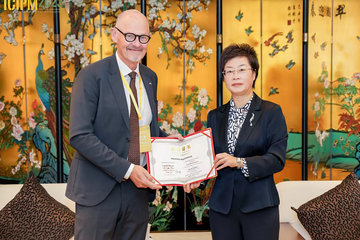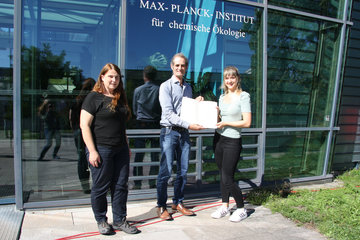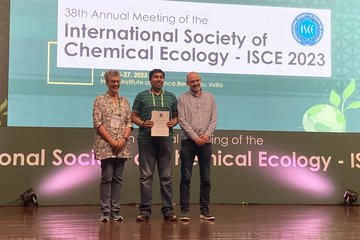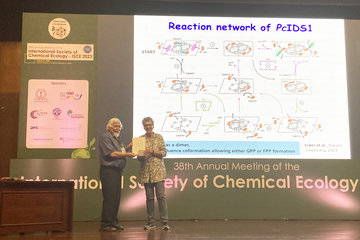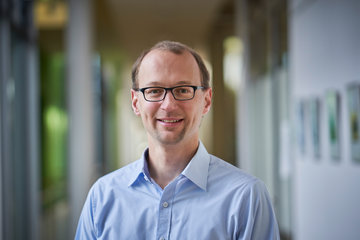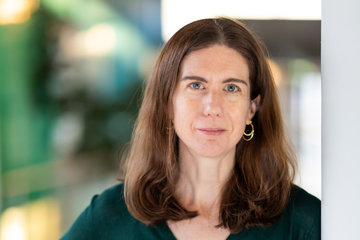Highest honor of the German government for Bill Hansson
The director at the Max Planck Institute for Chemical Ecology is awarded the Cross of Merit 1st class of the Federal Republic of Germany for his services to the internationalization of research in Germany and in Jena.
On May 18, 2021, Bill Hansson will receive the Cross of Merit of the Federal Republic of Germany from the hands of Thuringian Prime Minister Bodo Ramelow in Erfurt. The award acknowledges his outstanding services to the scientific community in Germany. The Swede, who has been conducting research at the Max Planck Institute for Chemical Ecology in Jena since 2005, was the first non-German vice president of the Max Planck Society from 2014 to 2020. In this role, he advanced the internationalization of the research organization and, at the same time, strengthened the welcoming culture for international scientists. In Jena, he has also made a very personal commitment to improving the integration of researchers from abroad: with an apartment building in which internationality and exchange are particularly important.
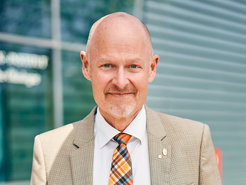
Science is international. Scientists speak a common language when it comes to their research. But moving to another country means you are confronted with many everyday problems that you are not necessarily prepared for. "When I came to Germany, I didn't always know what was expected of me. That is why I saw it as one of my primary task, as the first foreign vice president of the Max Planck Society, to optimize the integration process for researchers from abroad," says Bill Hansson. On his initiative, a travel guide for researchers was created, which also explains many German peculiarities. At the end of his term in office, the Planck Academy started its work offering many personal training measures, both at the various management levels and for advancing the career of young scientists.
Hansson's vice presidency was guided by the motto of internationalizing research in Germany. For example, he oversaw and advised the many Max Planck partner institutions worldwide. His leadership style has also been international in nature, especially due to his Swedish origin. "When it comes to leadership, I have advocated a more Scandinavian style: lots of pauses for conversation, open communication “per Du”, less hierarchy. I call this philosophy 'leadership through kindness' and I have always found it to work well in different environments. You could also sum it up like this: Happy co-workers perform better!" says Hansson. For this reason, it was also a matter close to his heart that the conditions for doctoral researchers were improved, their employment contracts adjusted and holiday entitlements equalized.
Bill Hansson has also been committed to helping researchers in Thuringia as a private citizen. One important concern of his was to create living space for foreign scientists in Jena where they could feel comfortable and better integrated. Together with his wife Susanne Erland, he became the builder-owner of a multi-family house with 13 apartments for German and international families in Jena, taking a major financial risk. The aim of this building project was to give young researchers and their families, especially if they come from a different cultural background, a better start in Jena by involving them early in an environment that leaves plenty of room for exchange and integration. From his own experience, Hansson knows how helpful this can be. The apartments are now filled with tenants even though it turned out much more complicated than expected to attract foreign scientists.
Hansson is very happy to be awarded the German Order of Merit: "It is hard to imagine a higher honor. As a foreigner, you always feel uncertain if you do enough for the taxpayers who fund your salary and research. The award shows that my activities have been noticed and appreciated."
After his time as vice president, during which he had to travel a lot around the globe, he is happy to be with his Department of Evolutionary Neuroethology in Jena. For despite his commitment as a science administrator, he is a researcher with heart and soul and can now concentrate all his energy on his research again. Several current projects are - how could it be otherwise - quite international in scope: Together with a research institute of the Chinese Academy of Sciences, the expert on odor-guided behavior in insects is investigating how locust plagues repeatedly occur in East Africa and South Asia. Another major collaboration is the German-Swedish Max Planck Center next Generation Insect Chemical Ecology, which studies the consequences of global climate change on insects and their interactions with other organisms. This includes insect ecosystem services such as pollination, but also the spread of invasive or vector insect species in Europe. The changes are studied through the lens of the chemical communication systems of moths, beetles, flies and mosquitoes: their sense of smell and the behavior controlled by it.
Further Information:
Press release of the Thüringer Staatskanzlei "Ministerpräsident Bodo Ramelow überreicht Verdienstkreuz 1. Klasse des Verdienstordens der Bundesrepublik Deutschland", May 17, 2021
Contact:
Angela Overmeyer, M.A., phone +49 3641 57-2110, e-mail overmeyer [at] ice.mpg.de, Max Planck Institute for Chemical Ecology, Hans-Knöll-Straße 8, 07745 Jena



